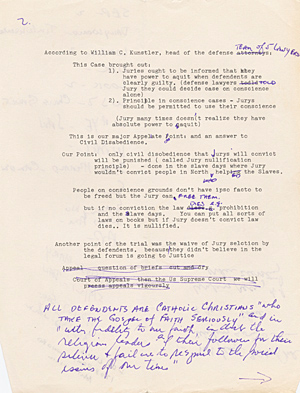 |
Some pertinent facts: Catonsville 9 action
 |
2 / 4 |
 |



| Collection: |
Cornell University Library |
| Date: |
1968 |
| Date of Digitization: |
2004 |
| Source: |
Daniel and Philip Berrigan Collection at the Division of Rare and Manuscript Collections, Cornell University Library |
| Original Dimensions: |
? |
| Creator: |
? |
|
|
Description:
These are some notes pertinent to the trial of the Catonsville Nine in Baltimore in October 1968.
Transcription: 2
According to William C. Kunstler, head of the defense team of 5 lawyers:
This case brought out:
1). Juries ought to be informed that they
have power to aquit when defendents are
clearly guilty. (defense lawyers told
Jury they could decide case on conscience
alone)
2). Principle in conscience cases - Jurys
should be permitted to use their conscience
(Jury many times doesn’t realize they have
absolute power to aquit)
This is our major Appellate point: and an answer to
Civil Disabedience.
Our Point: only civil disobedience that Jurys will convict
will be punished (called Jury nullification
principle) - done in the slave days where Jury
wouldn’t convict people in North who helped the Slaves.
People on conscience grounds don’t have ipso facto to
be freed but the Jury can free them.
but if no conviction the law dies e.g. prohibition
and the Slave days. You can put all sorts of
laws on books but if Jury doesn’t convict law
dies.. It is nullified.
Another point of the trial was the waive of Jury selection by
the defendents. because they didn’t believe in the
legal forum is going to Justice
All defendents are Catholic Christians “who
take the Gospel of Faith Seriously” and in
“with fidelity to our faith, in Christ the
religious leaders as their followers for their
silence & failure ro respond to the social
issues of our times”
>
|




